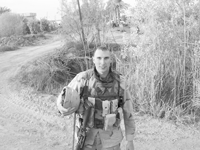One quarter of Don’t Ask, Don’t Tell outings based on soldiers’ posts to the Internet
As an artilleryman in the U.S. Army’s 1st Armored Division serving in Iraq, Specialist Jeff Howe’s computer expertise got him the job of maintaining his company’s blog for his unit’s friends and family members back home.
It was also this expertise that eventually got him outed as gay, and separated from the Army.
Motivated by patriotism, Howe, who is 32 and lives in the Chicago area, left a corporate sales job and enlisted in the Army right after the September 11 terrorist attacks. He served two years, part of which was spent in Iraq, and then had his enlistment involuntarily extended for another year-long tour in Iraq.
According to Howe, trouble started when he posted on the unit’s blog a photo of an Army truck that had been destroyed by an insurgent rocket. He believed the picture was innocuous, but also of interest to those back home. However, a superior objected to the picture, and Howe said, an investigation was begun to verify that he wasn’t a security threat.
Almost immediately, Howe was called before his commander and informed that the Army was sending him back to the States for discharge proceedings because he had violated the U.S. military’s Don’t Ask, Don’t Tell (DADT) policy that bans gays and lesbians from serving openly.
“It was all very sudden,” Howe said in an interview. “They told me I was being investigated, and then three days later I was told I was being discharged because I was gay.”
But more bewildering was the way in which the Army determined Howe was gay. The Army’s investigation uncovered an online profile Howe had posted while in the U.S. between tours on Connexion.org in which he had identified himself as gay. That was something he did not know was a violation of DADT.
“I received a very minimal explanation of Don’t Ask, Don’t Tell when I enlisted and had no idea what I did was against the regulation,” Howe said.
Howe’s case was first reported by the Web site Gay.com, and widely disseminated through a press release from the Service Member’s Legal Defense Network (SLDN), an organization that assists members of the U.S. military affected by Don’t Ask, Don’t Tell.
According to SLDN, online outing that has resulted in discharge from the military is not uncommon. Since January the organization has represented 10 soldiers outed because of biographical information posted on the Internet, about 25 percent of the total outings SLDN has monitored this year. The affected service members include a Farsi linguist, an intelligence analyst and a medical doctor.
“While some people might believe using such information against a service member violates military policy, the truth is such a statement in any forum is considered telling under Don’t Ask, Don’t Tell,” said Steve Ralls, a spokesman for SLDN.
Martha Rudd, an Army spokeswoman, confirmed this.
“A statement is a statement and therefore in violation of the policy,” she said. Rudd added that as a matter of policy the Army does not seek out online information about their personnel.
This appears to be the case, despite the number of service members outed this year. However, it does not mean military personnel should not be careful where and when they reveal their sexual orientation; online information when brought to the Army’s attention would likely prompt an investigation.
“The question as to how this information came up is an interesting one,” Ralls said. “It seems that colleagues of these service members might have done independent searches in order to find incriminating evidence.”
Ralls also said that in two of the cases it appeared an online profile was falsified so that it would prompt further investigation into the service member’s sexual orientation.
That should serve as a warning that gay and lesbian military personnel must exercise the utmost caution about what they disclose to co-workers or anyone else, Ralls added.
SLDN has posted a guide on its Web site to help current gay service members maintain their online privacy. Suggestions include avoiding screen names with terms such as “navy” or “marine” that suggest military connections, not identifying oneself as a service member and not posting pictures.
Gay.com and Connexion.org have also posted warnings on their sites.
The confusion over what constitutes a violation of DADT, especially in Howe’s case, might stem from what is considered by some the U.S. military’s lax training regarding the policy.
“Service members are supposed to receive annual training on Don’t Ask, Don’t Tell, but we hear on a routine basis that it just doesn’t occur,” Ralls said.
A current Army publication, “Dignity and Respect: A Training Guide on Homosexual Conduct Policy,” indicates that Don’t Tell means “soldiers should not discuss or disclose their sexual orientation with other soldiers.” The guide does not discuss instances of outing outside the military environment.
Howe said the only information he was given regarding DADT was a one-page memo issued during his first tour of duty—a memo that also summarized several other Army personnel policies.
But despite his discharge, Howe said he wishes he were still in Iraq.
“I feel like I was ripped out of there,” Howe said. “I want to be serving my country and helping my friends who are still getting shot at everyday.”
He also said he wouldn’t dissuade any gay or lesbian from serving: “The armed forces have a lot offer someone. If you’re gay, you just have to make sure no one knows about it.”
gaycitynews.com



































